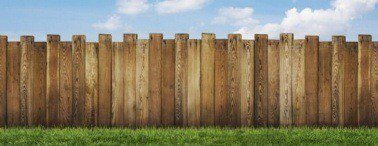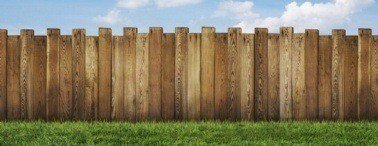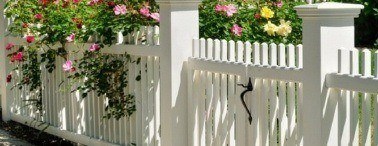
Vinyl is a relatively new fencing material that can be a fantastic alternative to wood paneled or aluminum rail fencing. Vinyl fencing has become very popular due to the fact that it is virtually maintenance free, it can last for decades and it is resistant to fading, rotting and decay unlike other conventional fencing materials. Because it has so many amenities compared to aluminum rail and wood paneled fencing, it can be much more expensive than its competitors. But besides a hefty price tag, vinyl fencing is also made using toxic materials, can quickly become a maintenance nightmare in the wrong conditions, or it might be illegal to install in your area. Use this guide to help you find out if vinyl fencing is the best fencing material to use for your fencing project.
Should I Hire a Professional or Can I DIY Vinyl Fence to Help Save Money?
Unlike conventional wood paneled fencing that can be forgiving of mistakes, vinyl fencing must be very accurate in its layout and placement or serious mistakes can occur. Prior to placing panels, vinyl posts must be leveled and set in concrete, in precise locations; which may be difficult at best for an amateur fence installer. If you've never installed a vinyl fence before, then call in the pros to get the job done right. If you're trying to save money on doing the installation yourself, installing a wooden or aluminum rail fence is the cheapest route available.
I want a Maintenance-Free Fence, is Vinyl the Best Option for My Yard?
That depends. Vinyl is often touted as a maintenance-free product. But for those who have vinyl products installed on their home or in their yard, they know vinyl needs at least biannual maintenance to look fresh and new as the day it was installed. Besides a basic pressure washing, some heavily soiled areas often require backbreaking scrubbing to come clean. Heavy pollen, falling leaves and sap can all quickly stain vinyl siding—sometimes permanently. If your vinyl fence plan is traversing through dense trees or high grass, you may want to consider installing a wood paneled or chain rail fence to keep maintenance and costs down.
I want a Vinyl Fence, but there are no other Vinyl Fences in my Neighborhood.
That may be because it's not allowed. If you live in a deed restricted community, you may not be able to install certain types of fencing. Some neighborhood programs only allow alternative fencing in parts of the yard, at certain heights or not at all, so it's always best to contact your local building department first before you call a professional installer. This way, you're sure to get the facts about fence codes and permitting straight from the enforcement agency themselves.
I Like Vinyl but my Yard is very Uneven and Hilly, Can I still Install Vinyl?
Yes. If your fence plan includes extreme dips or climbs, paneled fencing materials may not be the best choice. While vinyl panels do bend slightly, they can only do it so much. If the slope becomes too great, the panels may be installed in a stepped fashion. A professional fence contractor can tell you right away if a vinyl fence is a viable option over your hilly terrain. When hills and valleys become too steep, paneled fencing of any kind is unviable and rail or picket fencing may be the only option.
Fence Maintenance Basics
Your fence is more than just a property line. It also gives your home value and curb appeal, it keeps pets and people in (or out) and it also provides security around your yard and home. And because it's such a valuable investment, installation should definitely be left up to the professionals. But after they pack up their tools and leave, maintenance is always left up to the homeowner. No matter what type of fence you own, it can be difficult to keep your fence looking good if you don't know what to do. Use this guide to fence maintenance to keep your fence looking fresh and new for years to come.
Vinyl Fence
One of the easiest fence styles to clean, the vinyl fence is long lasting and virtually maintenance free year-round. A quick blast with a water hose every six months can easily keep your vinyl fence looking good for years to come. For tougher stains, a stiff bristled brush and bucket of oxygenated bleach/water can easily remove any stains that occur. NEVER use caustic chemicals like bleach or ammonia to clean any vinyl product. These toxic chemicals weaken vinyl's chemical bonds and when combined with sunlight, can cause vinyl to become brittle and break.
Wood Fence
Cleaning a wood fence can be a little tougher. Many times mold and mildew can become a problem and stain wood fencing permanently. This is where a wood fence cleaner or stain comes in handy. These chemicals are often dangerous and toxic and should be handled with care according to the manufacturer's specifications and recommendations. One of the easiest ways to apply fence stain is by using a garden sprayer/feeder attachment to distribute the cleaner/stain onto the fence—in fact several companies offer the attachment with the cleaning solution. After several minutes, the stain/cleaner is washed off with a garden hose. A plastic tarp can help prevent grass from being killed from toxic stains/cleaners.
Chain Link/Aluminum
Chain link fencing can get dirty easily and is simple to keep clean. A stiff bristled brush and a bucket of warm soapy water is a great way to keep chain link free from dirt and debris. A pressure washing can help bring back aluminum with heavy patina back to life. But when rust is visible, serious problems can occur and it needs to be immediately addressed to prevent it from spreading further. First apply a rust inhibiting agent and then apply a primer. Now successive coats of aluminum paint can be used to match the existing chain link. Heavily rusted sections, poles or hardware may need to be replaced.
Weed and Grass Problems
More often than not, a mechanical weed whacker is often used by homeowners to keep grass and weeds in check up against a fence. This is definitely not the best solution to the problem and can often create more problems than it solves. Weed and grass seeds are quickly distributed when a cutting tool is used. Powered cutting tools can also damage all types of fencing and should be avoided up against any fencing. Instead of a mechanical grass edger, opt out for a chemical weed and grass killer along the fence line to help keep grass and weeds in check without damaging your fence. Using successive layers of mulch can help prevent weeds and grass from coming back once it's been killed, keeping your fence weed free for months to come.
Posted by: TrustedPros





